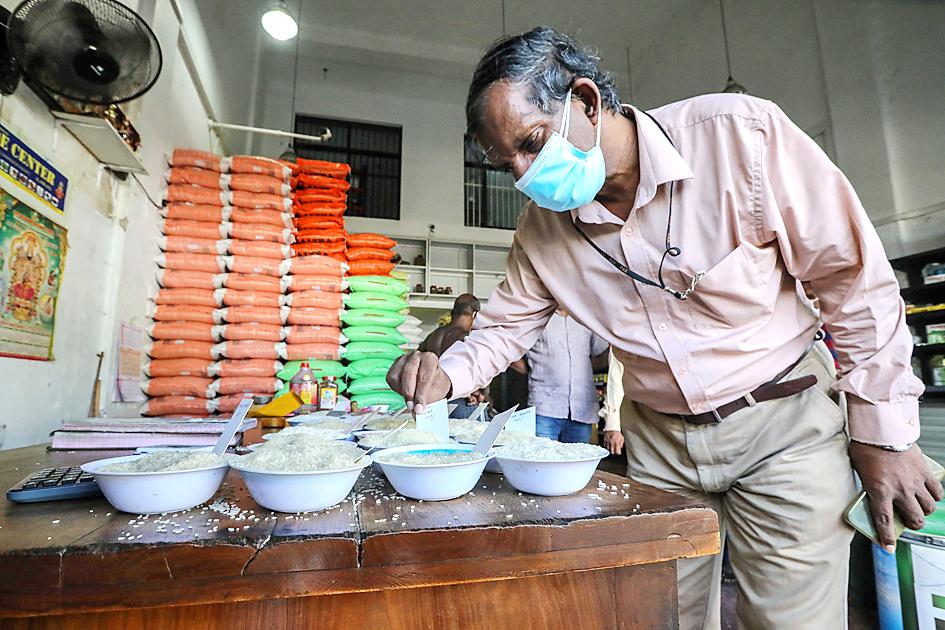Sri Lanka has barred a Chinese ship carrying desperately needed organic fertilizer that experts have found to be tainted with harmful bacteria, officials said yesterday.
The ban comes as Sri Lanka battles food shortages caused by a currency crisis.
Farmers have said that a ban on chemical fertilizer could ruin their crops this year.

Photo: EPA-EFE
The office of Sri Lankan President Gotabaya Rajapaksa said that the Sri Lankan National Plant Quarantine Services had tested a sample from the unnamed Chinese vessel and “confirmed the presence of organisms, including certain types of harmful bacteria.”
The Sri Lankan Commercial High Court has banned any payment to Qingdao Seawin Biotech Group for the 96,000 tonnes of fertilizer, an official statement added.
Authorities halted the US$42 million deal last month, but reports said that the cargo had still been shipped and was due in Colombo. The location of the ship has not been revealed.
The Sri Lanka Ports Authority said that the Sri Lankan Ministry of Agriculture on Saturday ordered it to prevent the unloading of the fertilizer in any port and to turn away the Chinese vessel.
Sri Lanka originally ordered the organic fertilizer from China as part of its efforts to become the world’s first fully organic farming nation.
The organic plant nutrients from China were meant to replace phased-out chemicals during the main rice cultivation season that started on Oct. 15.
Following widespread farmer protests that the abandoning of agrochemicals would critically hit yields, the Sri Lankan government last week lifted a ban on chemical fertilizer imposed in May.
It has since imported 30,000 tonnes of potassium chloride as fertilizer and about 3 million liters of nitrogen-based plant nutrients from India.
Farmers of tea — the main export commodity along with rice — have warned that crop yields could be halved without chemicals.

Philippine President Ferdinand Marcos Jr has fired his national police chief, who gained attention for leading the separate arrests of former Philippine president Rodrigo Duterte on orders of the International Criminal Court and televangelist Apollo Carreon Quiboloy, who is on the FBI’s most-wanted list for alleged child sex trafficking. Philippine Executive Secretary Lucas Bersamin did not cite a reason for the removal of General Nicolas Torre as head of the 232,000-member national police force, a position he was appointed to by Marcos in May and which he would have held until 2027. He was replaced by another senior police general, Jose

ANGER: Unrest worsened after a taxi driver was killed by a police vehicle on Thursday, as protesters set alight government buildings across the nation Protests worsened overnight across major cities of Indonesia, far beyond the capital, Jakarta, as demonstrators defied Indonesian President Prabowo Subianto’s call for calm. The most serious unrest was seen in the eastern city of Makassar, while protests also unfolded in Bandung, Surabaya, Solo and Yogyakarta. By yesterday morning, crowds had dispersed in Jakarta. Troops patrolled the streets with tactical vehicles and helped civilians clear trash, although smoke was still rising in various protest sites. Three people died and five were injured in Makassar when protesters set fire to the regional parliament building during a plenary session on Friday evening, according to

STILL AFLOAT: Satellite images show that a Chinese ship damaged in a collision earlier this month was under repair on Hainan, but Beijing has not commented on the incident Australia, Canada and the Philippines on Wednesday deployed three warships and aircraft for drills against simulated aerial threats off a disputed South China Sea shoal where Chinese forces have used risky maneuvers to try to drive away Manila’s aircraft and ships. The Philippine military said the naval drills east of Scarborough Shoal (Huangyan Island, 黃岩島) were concluded safely, and it did not mention any encounter with China’s coast guard, navy or suspected militia ships, which have been closely guarding the uninhabited fishing atoll off northwestern Philippines for years. Chinese officials did not immediately issue any comment on the naval drills, but they

POWER CONFLICT: The US president threatened to deploy National Guards in Baltimore. US media reports said he is also planning to station troops in Chicago US President Donald Trump on Sunday threatened to deploy National Guard troops to yet another Democratic stronghold, the Maryland city of Baltimore, as he seeks to expand his crackdown on crime and immigration. The Republican’s latest online rant about an “out of control, crime-ridden” city comes as Democratic state leaders — including Maryland Governor Wes Moore — line up to berate Trump on a high-profile political stage. Trump this month deployed the National Guard to the streets of Washington, in a widely criticized show of force the president said amounts to a federal takeover of US capital policing. The Guard began carrying